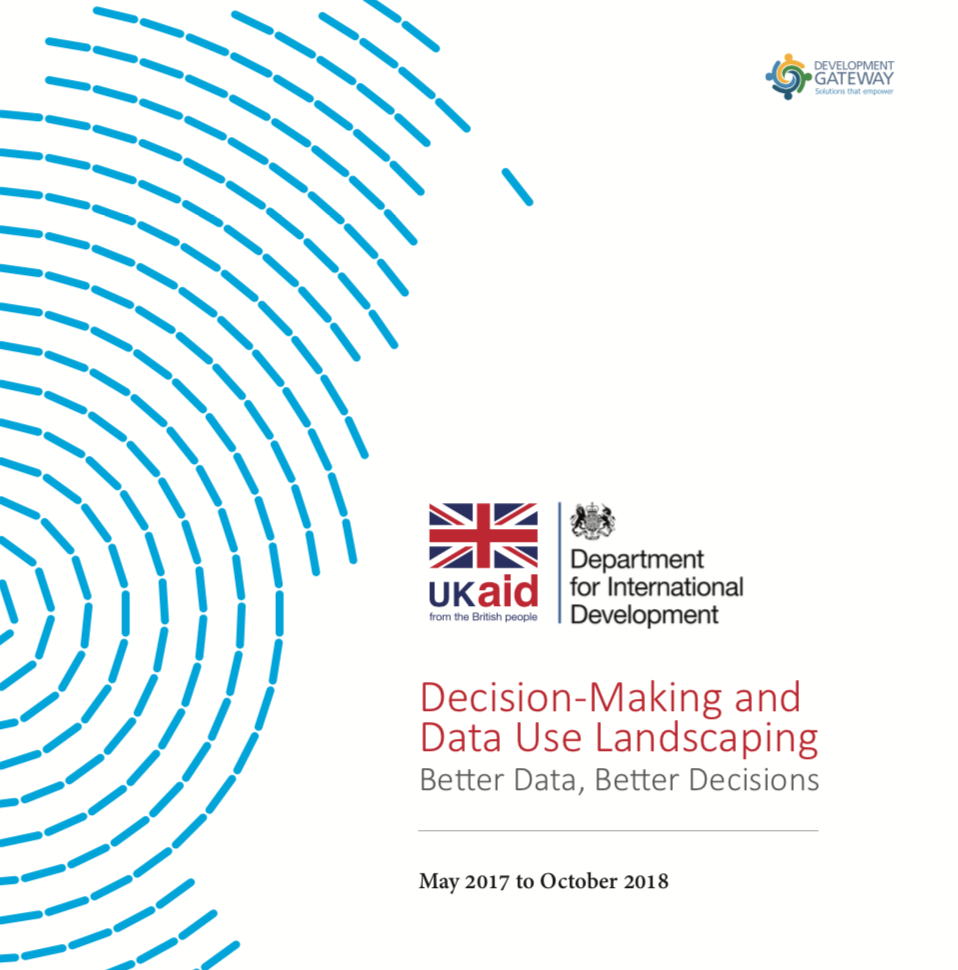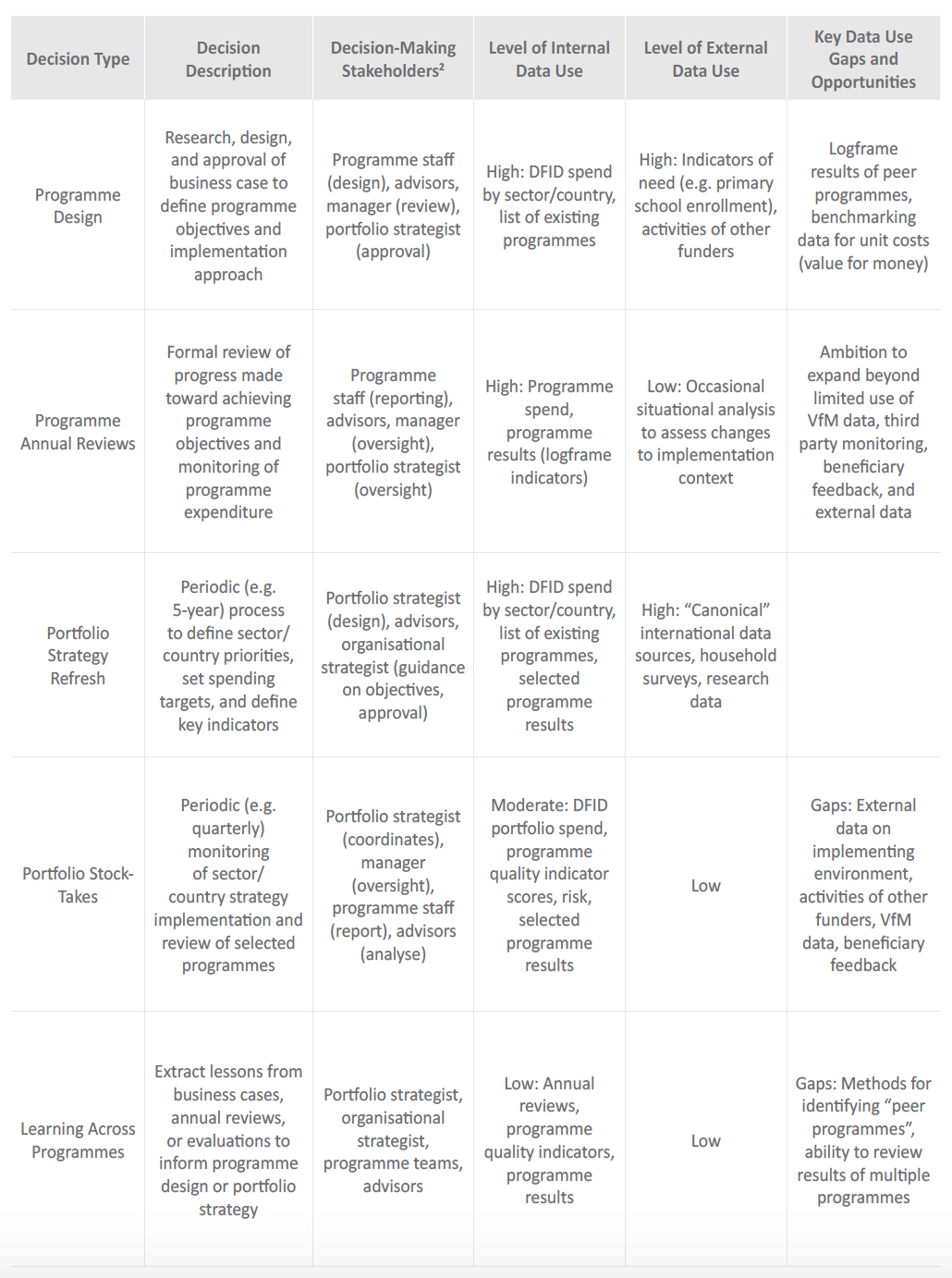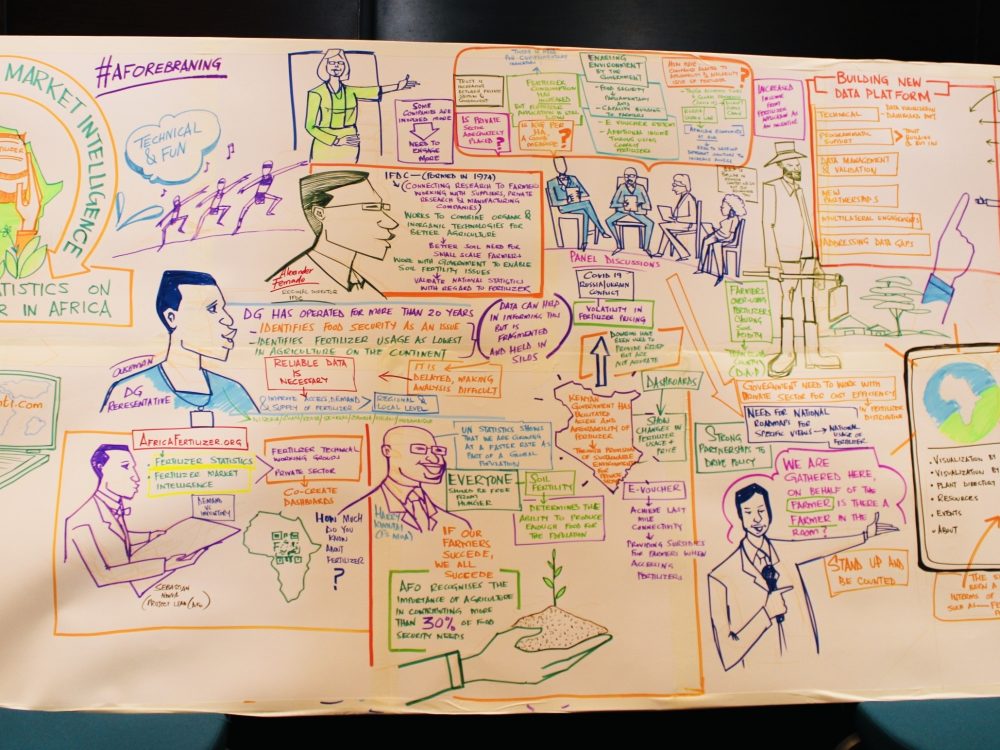Understanding How DFID Makes Decisions – Landscape Report on the Role of Data
The UK’s Department for International Development (DFID) and Development Gateway (DG) are pleased to release a new report entitled “Decision-Making and Data Use Landscaping: Better Data, Better Decisions – May 2017 to October 2018.” This work examines the role that data plays in supporting key decisions taken by DFID at the strategy, portfolio (sector or country), and programme level. Supported by the Bill & Melinda Gates Foundation through DG’s Results Data Initiative, the report synthesises in-depth interviews with approximately 60 DFID staff across four country offices, all sector teams, and senior management.

|
“At the Bill & Melinda Gates Foundation, we were pleased to support Development Gateway’s Results Data Initiative, and to see DFID’s leadership in seeking to strengthen its use of data and evidence to support decision-making. We are excited that DFID are adopting many of the report’s recommendations, and hope to continue to learn from DFID’s innovation in data for development. We are currently supporting DG in performing similar work for other development agencies, and see tremendous potential for shared learning across peer agencies, and improved development results through data.”– Rodrigo Salvado, Deputy Director, Development Policy and Finance, Bill & Melinda Gates Foundation |
This research took a decision-focussed approach: each interview began by seeking to understand the most important decisions regularly undertaken by DFID staff, and traced the process through which those decisions were made. Only after exploring the decision-making process was the subject of data – its current and aspirational roles, as well as opportunities and barriers for its greater use to drive decisions – introduced. The table below summarises each of five commonly-cited decisions, describing the process, stakeholders, role of data, and key gaps for each.

Figure 1: Overview of Key Decision-Making Processes and Data Gaps
Often-cited challenges included:
- performing portfolio-level analysis of data;
- using data for institutional learning (e.g. building programme design on the results of similar programmes in other contexts); and
- linking external data on context with internal data on results, funding and decisions — including strategic portfolio reviews and value for money.
Identifying ways in which DFID can more effectively use data to drive portfolio-level decisions (e.g. at sector or country office level) was a key opportunity cited by most DFID team members. Ultimately, staff aimed to ensure that DFID uses resources to do the “right things in the right places.”
Since the report was finalized in late 2017, its recommendations have been implemented by integrative work across analytical and technical professions in DFID, and made possible by the creation of a new cross-departmental DFID Statistics Hub. The report also informed DFID’s thinking on how to harness the potential of data in tackling extreme poverty.
This focuses on three pillars:
- Greater internal use of data (including data created by DFID and/or by third parties) in programme design, decision-making, and organisational learning. This includes building staff capability to effectively analyse and use data.
- Further strengthening DFID’s impressive record on transparency in its operations and results, through improvements to published statistics, data quality and accessibility.
- Investing in data to support the delivery of the Sustainable Development Goals through support to partner country governments; innovation in big data and satellite imagery; and strategic investments in high-impact partnerships like the Global Partnership for Sustainable Development Data (GPSDD).
DG has also been supporting DFID – in line with the portfolio analysis findings of this report – in the design and rollout of portfolio-level dashboards for sector policy teams and country offices. These dashboards have now been made more broadly available across DFID, and represent a unique opportunity for taking a portfolio approach to thinking about, measuring, and delivering impact.
Beyond DFID, many agencies are grappling with these same challenges. DG has been partnering with Global Affairs Canada (GAC) and UNICEF on a similar set of data priorities, and is currently partnering with the Swiss Development Cooperation (SDC), Swedish International Development Agency (SIDA), and Icelandic International Development Agency (IIDA) to support data for decision-making.
DFID and DG are committed to ensuring that the learning from this programme will benefit the broader development community, and have facilitated multiple peer learning opportunities between DFID, GAC, SDC, SIDA, and IIDA. We look forward to engaging more widely throughout 2019 and beyond to ensure that data help to drive the changes we hope to see in meeting the challenge of the SDGs.
Share This Post
Related from our library

Building a Sustainable Cashew Sector in West Africa Through Data and Collaboration
Cashew-IN project came to an end in August 2024 after four years of working with government agencies, producers, traders, processors, and development partners in the five implementing countries to co-create an online tool aimed to inform, support, promote, and strengthen Africa’s cashew industry. This blog outlines some of the key project highlights, including some of the challenges we faced, lessons learned, success stories, and identified opportunities for a more competitive cashew sector in West Africa.

Digital Transformation for Public Value: Development Gateway’s Insights from Agriculture & Open Contracting
In today’s fast-evolving world, governments and public organizations are under more pressure than ever before to deliver efficient, transparent services that align with public expectations. In this blog, we delve into the key concepts behind digital transformation and how it can enhance public value by promoting transparency, informing policy, and supporting evidence-based decision-making.

From Data Gaps to Impact: Key Insights from the VIFAA Program
Over the last six years, DG, together with its partners AfricaFertilizer (AFO) and Wallace & Associates, collaborated to implement the Visualizing Insights on Fertilizer for African Agriculture (VIFAA) Program. In the program’s final year (2024), the team undertook a “program learning process” to reflect on outcomes, challenges, and successes through internal interviews. This blog captures five key learnings, which we hope will guide similar programs aiming to bridge data gaps in agricultural development.